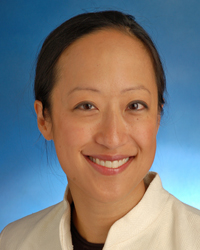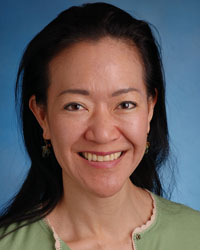Cutting-edge teamwork in gynecological oncology and surgery
Being told you may have ovarian, cervical, or another type of gynecological cancer is scary. But when Diablo Service Area patients are referred to a specialist, they’re in particularly good hands – four of them, in fact. That’s because Kaiser Permanente Walnut Creek has two of the Northern California region’s premiere specialists in gynecological oncology surgery, Dr. Elizabeth (Betty) Suh-Burgmann and Dr. Annette Chen.
And the two have been colleagues and close friends for more than 15 years, since they met while completing three-year fellowships at Massachusetts General Hospital following their residencies.
In fact, their mutual respect was so great that when Dr. Suh-Burgmann was establishing Walnut Creek’s gynecological oncology practice, the first person she thought of to join her was Dr. Chen. “We had similar styles and philosophies and always thought it would be great to go into practice together,” says Dr. Suh-Burgmann.
In 2007, she convinced Dr. Chen to leave the University of Massachusetts, where she taught as well as saw patients, and move west. “I’m an East Coast girl and had never thought about leaving,” says Dr. Chen, who grew up in Baltimore. “But when Betty called, my husband and I talked it over and decided: `We’re there.’”
Today the two surgeons have built a renowned specialty practice that’s in the forefront of cutting-edge surgical techniques. But more importantly, Drs. Suh-Burgmann and Chen work together to offer patients a team-based approach to patient-centered care.
“We both have the same goal, which is that we want to make it as easy as possible for patients as they go from beginning to end, from getting that first appointment to getting surgery if needed,” says Dr. Suh-Burgmann. “We want them to feel empowered and supported.”
Adds Dr. Chen: “We’re kind of interchangeable – we know what the other would do because it’s what we’d do ourselves. And it’s rare to have that kind of trust.
In the operating room, this coordination has resulted in remarkable efficiency, lowering surgery times to an average of 30 minutes. “It’s a joy operating together because we operate so similarly – each of us anticipates what the other is going to do,” Dr. Chen says.
The pair’s teamwork has allowed them to innovate, introducing robotic and laparoscopic technologies. “Working together has enabled both of us to push our skill sets forward,” says Suh-Burgmann. “We’ve switched over almost completely to minimally invasive techniques, including 99 percent of uterine cancer surgeries.” And their low complication rates reflect these innovative approaches.
With Dr. Chen’s help, Dr. Suh-Burgmann developed a new practice resource that establishes a step-by-step process for detection, reporting, referral and treatment for ovarian masses. “By standardizing the steps, we can do a better job of catching cancer early when treatment can be most successful while at the same time we can help women avoid having unnecessary surgery,” says Dr. Suh-Burgmann.
Those methods led to the publication of a landmark paper, Outcomes from ultrasound follow-up of small complex adnexal masses in women over 50, in the American Journal of Obstetrics and Gynecology in December, 2014 and online in July, 2014. [Link to paper: http://www.ajog.org/article/S0002-9378%2814%2900793-5/abstract] In the first large population-based study of such small tumors, Dr. Suh-Burgmann found the actual rate of malignancy to be just one in 200, much lower than had previously been thought.
Drs. Suh-Burgmann and Chen share their ideas with colleagues in all 5 of the Northern California region’s gynecological oncology centers. By centralizing gynecological cancer treatment in high-volume centers, Kaiser Permanente makes it possible for all members to receive care from highly experienced specialists, the two say.
“Nationally, less than 50 percent of women with ovarian cancer receive care from a gynecological oncologist,” says Dr. Suh-Burgmann. “But here at Kaiser Permanente it’s over 95 percent. We’re proud of that.”
Not only do the oncologists feel lucky to be part of Kaiser Permanente’s integrated care system, they also feel lucky to have found such a special partnership, one that supports them at work and at home. “Moving to California has been a complete lifestyle change – I feel like I’ve achieved that illusory work-life balance,” says Dr Chen, who lives with her husband and three children in Walnut Creek. Adds Dr. Suh-Burgmann, who lives with her husband and two sons in Berkeley: “It’s the dream of having your partner be your best friend.”



